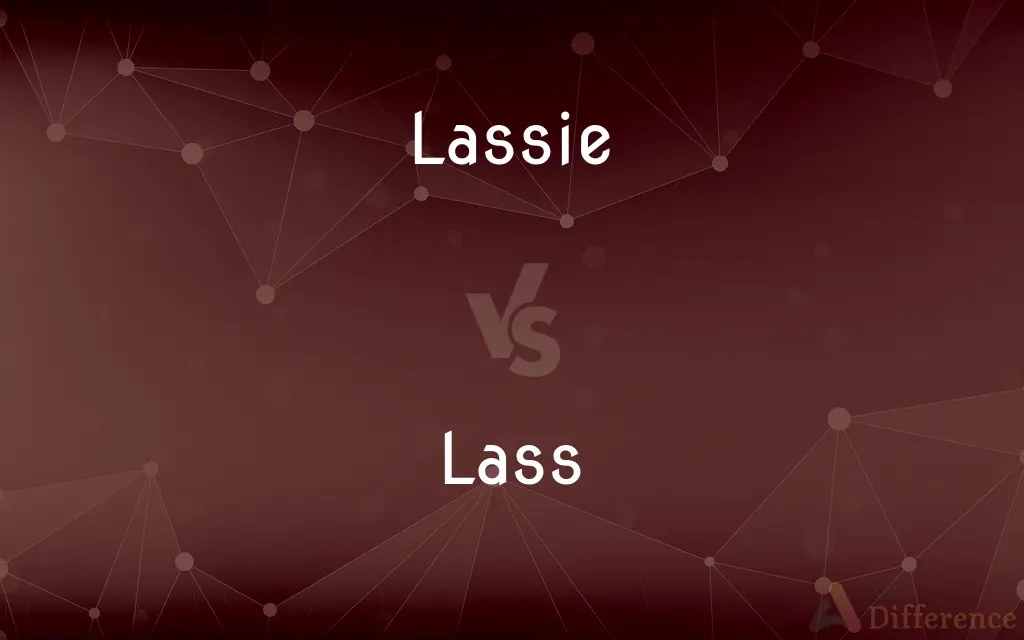Lassie vs. Lass — What's the Difference?
By Maham Liaqat & Fiza Rafique — Updated on March 19, 2024
"Lassie" typically refers to a young girl or woman, often with connotations of youth and vitality, while "Lass" is a more general term for a young woman or girl, used mainly in Scottish and Northern English dialects.

Difference Between Lassie and Lass
Table of Contents
ADVERTISEMENT
Key Differences
"Lassie" is often used affectionately to denote a young girl or woman, particularly in literary or historical contexts, suggesting a sense of innocence and charm. On the other hand, "Lass" is a straightforward term for a young woman or girl, widely used in Scotland and Northern England without the same connotative layers.
The term "Lassie" can also evoke specific cultural references, such as the famous fictional collie dog from movies and television, which adds an element of familiarity and endearment. Whereas, "Lass" is devoid of such specific associations, serving as a more neutral descriptor.
"Lassie" may carry a slightly more diminutive or endearing tone, implying youthfulness and perhaps a degree of naivety. In contrast, "Lass" is a more neutral term, without inherently suggesting the same level of youth or innocence.
Despite their differences, both terms are ultimately rooted in affection and familiarity, serving as colloquial terms for referring to young females with a sense of warmth. "Lassie," with its specific cultural associations and slightly more affectionate connotations, contrasts with the more universally understood and applied "Lass."
Comparison Chart
Connotation
Affectionate, often implying youth and innocence.
Neutral, simply denotes a young woman or girl.
ADVERTISEMENT
Usage
More specific, with literary and cultural references.
Broad, commonly used in Scottish and Northern English dialects.
Cultural References
Associated with the fictional dog character.
Lacks specific cultural associations.
Tone
Slightly diminutive and endearing.
More straightforward and neutral.
Root
Affection and familiarity, with a hint of charm.
Affection and familiarity, without additional connotations.
Compare with Definitions
Lassie
Implies youth and innocence.
The lassie danced through the fields, carefree.
Lass
Young woman or girl.
The lass from the village won the annual race.
Lassie
Affectionate term.
The old man called the young waitress lassie with a smile.
Lass
Broad usage.
Everywhere in the Highlands, you'll hear fathers call their daughters lass.
Lassie
Cultural icon.
Lassie, the heroic collie, saved the day in many stories.
Lass
Scottish/Northern English dialect.
That's a brave lass, commented the Scotsman.
Lassie
Literary usage.
In many Scottish tales, lassie is used to depict young heroines.
Lass
Lack of specific associations.
The term lass is used widely without any specific cultural or fictional connotations.
Lassie
Endearing connotation.
Don't worry, lassie, we'll find your way home, said the kind stranger.
Lass
Neutral descriptor.
The lass at the counter served us with a warm smile.
Lassie
Lassie is a fictional female Rough Collie dog, and is featured in a short story by Eric Knight that was later expanded to a full-length novel called Lassie Come-Home. Knight's portrayal of Lassie bears some features in common with another fictional female collie of the same name, featured in the British writer Elizabeth Gaskell's 1859 short story "The Half Brothers".
Lass
A girl or young woman
He married a lass from Yorkshire
Village lasses
Lassie
A lass.
Lass
A girl or young woman.
Lassie
A young girl, a lass, especially one seen as a sweetheart.
Lass
A sweetheart.
Lassie
A young girl; a lass.
Lass
A young woman or girl.
Come and dance, ye lads and lasses!
Lassie
A girl or young woman who is unmarried
Lass
A sweetheart.
Lass
A young woman; a girl; a sweetheart.
Lass
A girl or young woman who is unmarried
Common Curiosities
Can "lassie" refer to someone other than a young girl?
While typically referring to young girls, "lassie" can be used affectionately for young women.
How is "lass" used in a sentence?
"Lass" is used simply to refer to a young woman or girl, e.g., "The lass over there is my sister."
What does "lassie" imply?
"Lassie" implies youth, innocence, and charm, often used affectionately.
Is "lass" specific to any region?
Yes, "lass" is particularly used in Scottish and Northern English dialects.
Is "lassie" still commonly used today?
"Lassie" is less common in everyday speech but persists in literature, film, and specific cultural references.
What are the cultural associations of "lassie"?
"Lassie" is famously associated with the fictional collie dog, a symbol of loyalty and bravery.
How does "lassie" convey affection?
Through its connotations of youth and charm, "lassie" often carries an affectionate tone.
Can "lass" be used affectionately?
Yes, "lass" can be used affectionately, depending on context and tone.
Is "lass" a formal term?
"Lass" is informal, used colloquially rather than in formal contexts.
Do "lassie" and "lass" have the same origin?
Both terms likely share origins but have evolved differently in usage and connotation.
Is "lassie" ever used in a derogatory manner?
While generally affectionate, context is key, as it could be perceived as patronizing if used inappropriately.
What makes "lass" neutral?
Its straightforward use as a descriptor without additional connotations makes "lass" more neutral.
Are there any famous characters named "Lassie"?
Yes, the most famous "Lassie" is the fictional collie from various movies and TV shows.
Can "lassie" be used for adult women?
It can, especially affectionately or in a diminutive sense, though it primarily denotes younger females.
How do "lassie" and "lass" reflect cultural differences?
"Lassie" carries specific cultural and literary associations, particularly with Scottish culture, whereas "lass" is more broadly used in Scotland and Northern England without those specific ties.
Share Your Discovery

Previous Comparison
Waterfall vs. Cataract
Next Comparison
Demur vs. DeferAuthor Spotlight
Written by
Maham LiaqatCo-written by
Fiza RafiqueFiza Rafique is a skilled content writer at AskDifference.com, where she meticulously refines and enhances written pieces. Drawing from her vast editorial expertise, Fiza ensures clarity, accuracy, and precision in every article. Passionate about language, she continually seeks to elevate the quality of content for readers worldwide.













































